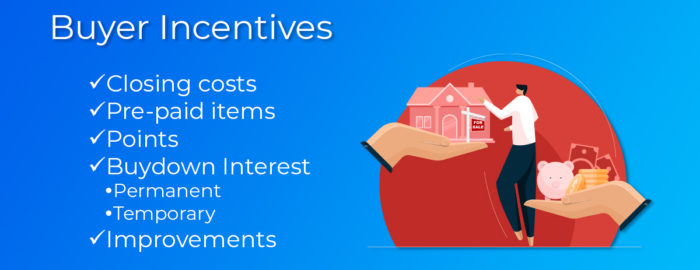Last year, sellers weren’t necessarily willing to make any concessions. This year, due to the softening of the market because of inflation and higher mortgage rates affecting affordability for buyers, they are much more likely to do so.
Let’s discuss concessions. They can take place in many forms. A seller could offer to pay the buyer’s closing costs or pay points for the buyer to get an FHA or VA loan. Another option would be to pay for a 2/1 buydown that would lower the buyer’s payments in the first two years of the mortgage.
Buydowns can be temporary or permanent and are achieved by pre-paying the interest at the time of closing. Typically, the seller will do this as an inducement to the buyer. While individual lenders set the price for permanent buydowns, a common rule-of-thumb would be two points, or two percent of the mortgage amount, to buydown the rate 0.5% for the life of the mortgage.
A 2/1 is a more common type of buydown. This is where the payment is calculated at 2% lower than the note rate for the first year and 1% lower for the second year. The third and following years, the payment would be calculated at the note rate.
| $400,000 Purchase Price, 80% loan-to-value @6.27% for 30 years Cost of buydown – $8,099 |
|||
| 1st year | 2nd year | Remainder | |
| Payment Rate | 4.27% | 5.27% | 6.27% |
| P&I Payments | $1,775 | $1,992 | $2,221 |
| Monthly Savings | $446 | $229 | |
Looking at the example above, we see that the seller would pre-pay the interest on the buyer’s mortgage for the first two years to subsidize the difference in the note rate and the payment rate.
A 2/1 buydown is a fixed interest rate mortgage where the buyer must qualify at the note rate. It is a standard, conforming loan and applies to FHA, VA, or conventional. The benefit is that the buyer will have lower payments for the first two years which can help them settle into the home and not exhaust their resources initially.
In many cases, both closing costs and pre-paid items are included in seller-paid incentives for the buyer. They’re normally described in the listing and/or sales agreement as “Seller to pay up to $X,000 in closing costs or pre-paid items on behalf of the buyer.”
So what’s the benefit? Quite simple – the benefit to the buyer is that less money is needed to close the loan. Lenders are agreeable to this type of provision if it is stated in the sales contract.
An example of how incentives have been provided over quite a few years is car dealers. They’ve used incentives in the form of upgrades, below market interest rates, pre-paid regular service for a period, and other things to incentivize a buyer to purchase now. It is also common practice for new home builders to do the same.
When it comes to the resale home market, while these things have been done in the past, there wasn’t a need for sellers to incur the additional expenses with such a short supply of homes. The market certainly changed in 2022 with fewer qualified buyers in the market due to the higher interest rates. Now, sellers are starting to offer incentives but regardless, buyers can include the incentives in a sales contract for the seller to consider.
Your agent will be able to help you understand what things are common in your market to help with some of the concerns facing buyers today.
I can provide Insider Information on Fairfax VA homes for sale. Get you a FREE Market Snapshot Report of Your Northern Virginia Home’s Value, or Search All Northern Virginia Homes For Sale. Put that data you need at the tips of your fingers!


